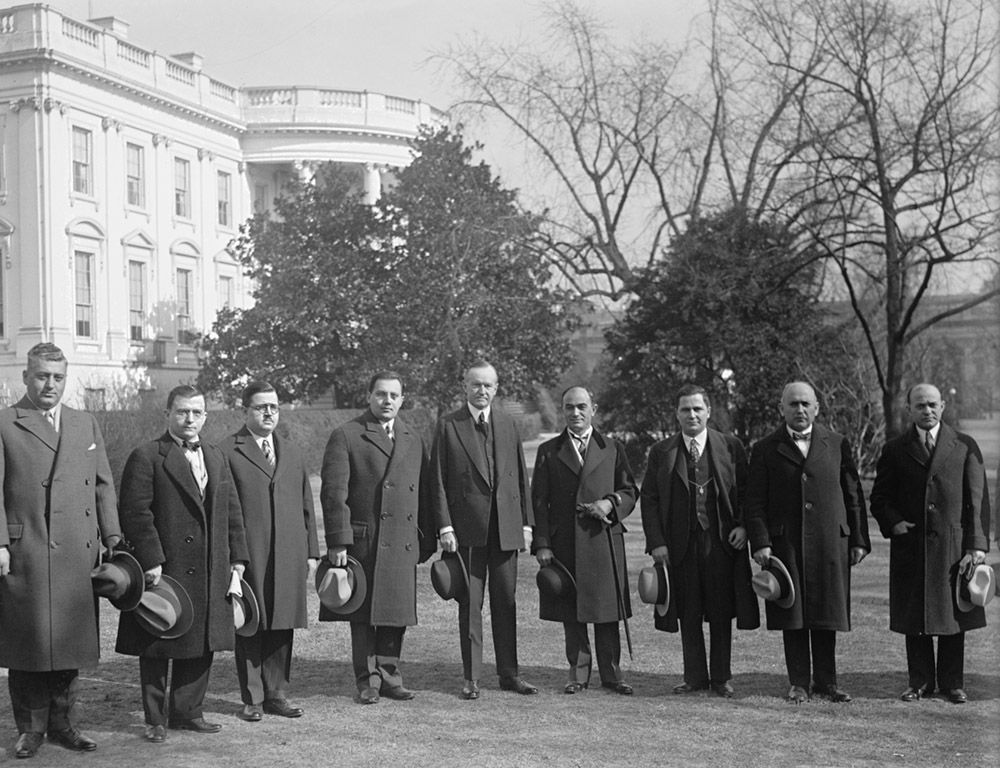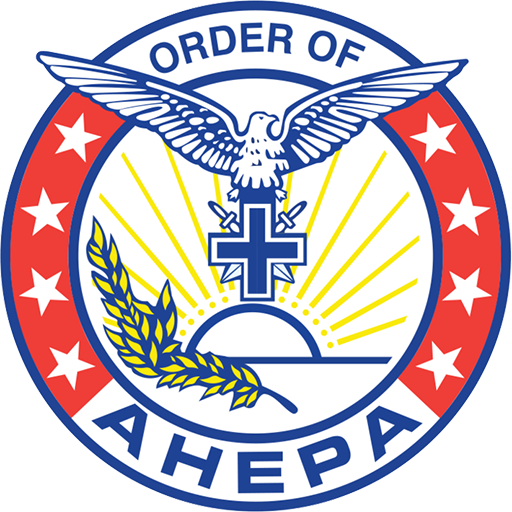
History
Founded in 1922 in Atlanta, Georgia, on the principles that undergirded its fight for civil rights and against discrimination, bigotry, and hatred felt at the hands of the Ku Klux Klan, AHEPA is the largest and oldest grassroots association of American citizens of Greek heritage and Philhellenes with more than 400 chapters across the United States, Canada, and Europe.
Mission
To promote the ancient Hellenic ideals of education, philanthropy, civic responsibility, family and individual excellence through community service and volunteerism.
AHEPA Steve Tsagaris Chapter 356, composed primarily, but not solely, of Americans of Greek decent living in the Clearwater/Tampa Bay area, was chartered by the Supreme Lodge of AHEPA on July 26th, 1954. This upcoming July, our chapter will celebrate its 62nd anniversary.
The group was organized in response to the strong desire of a number of these American-Hellenes to join the national AHEPA organization founded in 1922 in Atlanta, Georgia. Their belief was that by working together with other like-minded men, they could help “Americanize” those who had recently immigrated to this country from Greece and at the same time nourish the history, ethics and ideals of their Hellenic forebears by cultivating a sense of “Hellenism” in America.
The primary objectives of the AHEPA were to promote “education,” “individual excellence”, “philanthropy,” “civic responsibility,” and “family values”. By establishing social and business ties between themselves and other like minded Americans of Greek extraction, they could promote and perpetuate the Hellenic culture and traditions of which they were so proud. They were especially proud of the Hellenic ideals, which are so clearly embodied in our U.S. Constitution and form the basis of our American democratic values.
The original core of activists who founded Chapter 356 included such brothers as Frank Fotiadis, the first President of the Chapter, along with Charter members, James Andrews, Thomas Andrews, Theo Condos, Sarafem Dervich, James Karalekas, Dr. George Karlton, Pete Katsouropoulos, Constantine Marmaredes, John Maros, Pete Moundredes, A.P. Nichols, James N. Psalta, Pete Psomadakis, Chris A. Sarris and Thomas C. Sarris. Thanks to their vision and dedication, AHEPA has thrived locally.
Over the years the Chapter has established itself as a leader in the life of the AHEPA family. In addition to being one of the largest chapters in the AHEPA domain, it has contributed a number of its members for higher national office. Past Supreme Vice President and member of the AHEPA Scholarship Foundation, Gus Stefanadis was a longtime member of Chapter 356. So too, are Past Supreme Governor Steve Tsagaris and Past District 2 Governors, Alex Alexander, Michael Mastorides and Domino Giallourakis along with current District 2 Athletic Director Gus Pantelides.
More recently Chapter 356 has rededicated itself to the ideals of Hellenism as applied to our current lifestyle. Just as our forebears taught that education of the individual is a critical element in each person’s growth and success and should never stop, so too, networking, pursuit of excellence, good family values and a recognition of one’s civic responsibility are important factors which must be forever considered and encouraged.
We believe that the Order of AHEPA has an important role to play in rekindling these Hellenic ideals. By providing our members with an opportunity to become informed about subjects of current interest, by stimulating their interest in charitable, educational and community projects, and by organizing games and athletic contests for exercise and competition in a spirit of brotherhood and respect for each other, we believe AHEPA can be a critical factor.
Likewise, we are convinced that AHEPA should defend its Hellenic heritage against those who would revise and distort history for their own ends. We recognize that “Americanism” as we know and enjoy it today embodies the objectives, elements and traditions of Hellenism, a proud heritage which all Ahepans are privileged to share. We must also speak up and defend our Hellenic traditions and the contributions of the ancient Hellenes to Western civilization. To these objectives and goals we pledge our commitment.
Hellenism
An important component of AHEPA’s mission is to create an awareness of the principles of Hellenism to society. These principles include a commitment to humanity, freedom, and democracy. The preservation and promotion of these ideals is where AHEPA has, and always will be, deeply committed.
AHEPA educates the community on these matters through symposia, forums, and conferences.
Education
AHEPA’s commitment to education has been well documented throughout its history. Over $4 million is endowed at the local, district and national levels toward the use of scholarships and a half-million dollars is awarded annually. Thousands of young men and women have benefited as recipients of AHEPA scholarships at these various levels. The most famous recipient, perhaps, is ABC News’ Host of This Week George Stephanopoulos.
The scholarship program at the national level is administered by the AHEPA National Educational Foundation. It offers scholarships to a wide variety of students. Recipients are: traditional and non-traditional students; seminarians, including those entering Holy Cross Greek School of Theology; and high school seniors, college and post-graduate students who are looking to become tomorrow’s leaders.
The preservation of Hellenic or Classical Studies programs on college campuses is an important issue for the AHEPA Educational Foundation. A subcommittee of the Foundation, the Hellenic Cultural Commission, actively works to support the study of the Classics at universities.
In addition, educational programs such as “Journey to Greece” and Washington Internships are sponsored by the Foundation.
Philanthropy
Philanthropy and volunteerism have been pillars of strength for AHEPA. From natural disaster relief to raising funds for the elimination of life-threatening diseases to making significant contributions to our local neighborhoods, AHEPA is at the forefront of charitable giving.
AHEPA’s philanthropic deeds are evident in the restoration of the Statue of Liberty and Ellis Island; in the Halls of St. Basil Academy, a childcare facility in Garrison, N.Y.; in the care packages we sent to our troops in cooperation with the USO; and in the building of healthcare facilities in Greece. Yet this only scratches the surface of the numerous philanthropic works of the association. In addition, countless charitable projects are undertaken every year by AHEPA’s chapters and districts.
Our grassroots has a strong voice. With chapters in every major metropolitan city and in rural areas of North America, AHEPA communicates the positions of the Greek-American community to elected representatives at the federal, state, and local levels, as well as to our diplomatic leaders. These issues pertain to Greece, Cyprus, and Turkey; however, our constituents are also interested in domestic policy areas affecting the philanthropic, civic, and community service-based programs in which they are involved. These positions are based upon our American heritage and ideals with the best interest of the United States in mind.
AHEPA educates its constituents about these issues through seminars and conferences, providing expert panelists from the U.S. government, prominent Washington, DC Think-Tank organizations, and the business world.
Furthermore, AHEPA keeps a watchful eye on Congress with its Congressional Scorecard, a tool that evaluates each member of Congress on Greek-American issues.
Family and Individual Excellence
What makes AHEPA unique from other organizations is the creation of the AHEPA Family. Together with three affiliated organizations, the AHEPA Family works as a unit toward the fulfillment of a common mission. Combined, the four organizations have contributed well over a billion dollars to national projects throughout their history.
- The Daughters of Penelope was established November 16, 1929 as the Women’s Affiliate of AHEPA. It is the first Greek-American women’s organization in the United States. One of its crowning achievements is Penelope House, a shelter for battered women in Mobile, Alabama. It is the first shelter for battered women and their children in that state.
- The Sons of Pericles was established February 3, 1926, and was officially recognized as the Junior Order of AHEPA in 1928. Finally, the Maids of Athena was founded July 5, 1930 as the Junior Women’s Auxiliary of AHEPA. The two youth groups have combined to contribute to such worthy causes as: Muscular Dystrophy, Deborah Heart and Lung Foundation, the Special Olympics, St. Basil Academy and Cooley’s Anemia research.
AHEPA members are proud of the contributions the ancient Greeks gifted to Western Civilization. As Americans, we share many of the values put forth by them: civic responsibility, philanthropy, education, family and individual excellence, and the ideals of democracy. This is the essence of our heritage. This is the core of our mission.
Moreover, throughout the span of its history, AHEPA has served as a vital vehicle for the progressive development and emergence of American citizens of Greek heritage into every facet of society: government, business, education, and the arts. This fulfillment illustrates the promise of the American Dream and symbolizes the hard work ethic of our immigrant forbearers who labored to achieve that dream with the principles of Hellenism rooted deep in their hearts.
AHEPA Marrow Donor Registry asks AHEPANS for support.
Last year, some 35,000 children and adults with life-threatening diseases could have benefited from a marrow, blood stem cell or cord blood transplant. Some found a donor within their families, but 70 percent were put in the unthinkable position of desperately searching among strangers for a match.Steve Pappas was among them. A high school English teacher and one of the most respected basketball coaches in Chicago, Pappas was battling an aggressive case of non-Hodgkin’s lymphoma this summer when doctors told him he was in urgent need of a transplant. None of his relatives turned up as a match. So, with a massive outpouring of support from former players and coaches, and his friends and teaching colleagues, Pappas turned to the AHEPA Marrow Donor Registry with a critical mission to find a compatible donor. Because Steve was Greek and because of the way the donation process works, that donor would likely have to be of Hellenic descent. We found the Greek community to be overwhelming in its moral support of “Team Pappas”, particularly the St. Demetrios parish in Chicago where Steve had long been a basketball coach. And we tested a remarkable number of volunteers—just under 3000 in three months. Sadly, though, it wasn’t enough to find Steve a donor. He died on June 8, 2006.
Steve’s fruitless search is pretty typical. Greek cancer patients have a difficult time finding suitable marrow or blood stem cell donors because of the very fact that they are Greek—people of Hellenic heritage are severely under-represented in the national and international marrow registries. And our own AHEPA Marrow Donor Registry, with just 11,000 potential donors, is far from where it needs to be to provide tangible assistance for the vast numbers of Greek cancer patients. That’s the sole reason why the Registry came into existence nearly 20 years ago. In 1987 Dr. Peter Gallas was stricken with acute myelogenous leukemia. He had recently received his M.D. from Wayne State University in Michigan, and was serving as a resident in anesthesiology at the University of South Florida in Tampa. Peter’s family in the United States and in Greece was tested, but no one came up as a compatible donor. Then, Dr. Peter Paulus (PSP) of Ocala, Fla. stepped in and volunteered to head an AHEPA Committee that would enact a nationwide effort to recruit funds and donors and, most importantly, to find Peter a match. Unfortunately, Peter died before a donor was ever found, but his legacy lives on in the AHEPA Marrow Donor Registry.
Since then, over the last 20 years, the Registry has been managed by a small but dedicated group of volunteers in New Jersey, led by Angelo Pantazes. This group had the difficult task of raising funds to cover testing costs for volunteer donors ($50 for each person tested), and, amazingly, adding nearly 9,000 active donors to the Registry database.
About Thalassemia
